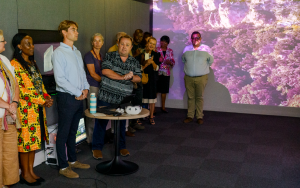
Early identification of children with intellectual and developmental disabilities is crucial
Urgent action needed to support children with intellectual and developmental disabilities
- Children with intellectual and developmental disabilities are being left behind.
- There is a need for early detection, identification and intervention.
- Disability must be a key part of early childhood development policies.
In South Africa, thousands of children with intellectual and developmental disabilities are being left behind because they are not identified early enough to receive the care and support they need.
The situation is worsened by a lack of reliable national data on childhood disability, particularly for children under five, making it difficult to plan and provide appropriate services and support.
As government revises its National Integrated Early Childhood Development (NIECD) Policy, researchers at Stellenbosch University (SU) and the University of Cape Town* are calling for urgent action to close this critical gap. They compiled a policy brief on how inclusive the country’s healthcare system is regarding people with intellectual and developmental disabilities, especially children.
They used different sources for their assessment and also drew on the Missing Billion Initiative’s Health Systems Framework, a tool used by the Special Olympics’ Rosemary Collaboratory Initiative to assess and improve healthcare for people with intellectual and developmental disabilities (IDD). They used this framework because of its ability to illustrate how systemic factors influence service delivery and produce outputs and outcomes relevant to people with disabilities.
“There is a need for policy plans on early detection, identification and intervention in the case of children with, or at risk for, intellectual and developmental disabilities. Early screening and identification of delays in development are essential to optimise children’s growth and functioning. Unfortunately, existing action plans tend to have a limited focus on primary prevention to reduce intellectual and developmental disabilities,” says lead researcher Prof Lieketseng Ned from the Division of Disability and Rehabilitation Studies at SU.
“National early childhood development systems must include comprehensive measures to support early detection and response services, enabling all children to develop to their full potential. Early childhood development is the foundation for lifelong learning, health, and wellbeing.”
Ned notes that despite its universal intent, the NIECD Policy continues to be limited in enabling early identification of children with intellectual and developmental disabilities. First introduced in 2015, the policy set out to coordinate holistic services to support children from birth to school-going age. A key tool to achieve this vision is the Road to Health Booklet, a small but powerful record of a child’s growth, vaccinations, and developmental milestones.
“This booklet is an incredible opportunity to ensure early identification, but it’s not being fully used to its potential. It is ineffective in identifying developmental delays early and providing early intervention because many nurses and healthcare workers reported that they struggle to use it effectively beyond its nutritional component.
“This lack of knowledge and perceived complexity hinders the proper use of the Health Booklet, undermines the early identification efforts and contributes to the under-detection of developmental delays at primary care level compared to assessments by paediatricians,” says Ned.
“The situation is made worse by other contributing factors, including a shortage of well-trained professionals on intellectual and developmental disabilities, completed assessments of poor quality, and limited referrals to rehabilitation services for children needing care. As a result, developmental concerns are often missed, leaving many children undiagnosed until much later — if at all.”
Ned says there is also a need for early assessments of unborn HIV-exposed babies because they may have high rates of neurodevelopmental disorders. “HIV-exposed, uninfected children are particularly vulnerable, due to a lack of adequate early identification and follow-up of intellectual and developmental disabilities.”
She and her fellow researchers recommend stronger measures for early detection and care as the NIECD policy undergoes revision. These include updating the Road to Health Booklet, training healthcare workers, empowering caregivers, and strengthening multisectoral collaboration.
“A standardised, simple screening checklist for intellectual and developmental disabilities should be included in the Health Booklet, with clear prompts and alerts for developmental delays to improve early diagnosis, data accuracy, and follow-up care. It should also include clearer referral pathways. This will ensure that children who are flagged during screenings are quickly referred to specialists for timely assessments, a formal diagnosis and other disability support.
“Nurses and community health workers must be equipped with the skills to recognise developmental delays and to use the booklet effectively. Families must also be provided with knowledge to track their child’s milestones and seek help when concerns arise,” says Ned. “Links between health services, early childhood development centres, and disability support organisations need to be strengthened to create a seamless system of care.”
Ned concludes that South Africa has an opportunity to lead by example in mainstreaming disability into its early childhood development policies. “With the NIECD revisions underway, now is the ideal time to ensure that no child is left behind because of preventable delays in detection.”
- Source: Ned, L; Dwadwa-Henda, N; Tyabashe-Phume, B & Kleintjes, S 2025. Mainstreaming Disability in the National Integrated Early Childhood Development (NIECD) Policy: A Focus on Children with Intellectual and Developmental Disabilities (IDD); Policy Brief.
*The policy brief was compiled by Prof Lieketseng Ned, Dr Nomvo Dwadwa-Henda & Dr Babalwa Tyabashe-Phume from the Division of Disability and Rehabilitation Studies at SU, and Prof Sharon Kleintjes from the Department of Psychiatry and Mental Health at the University of Cape Town.



